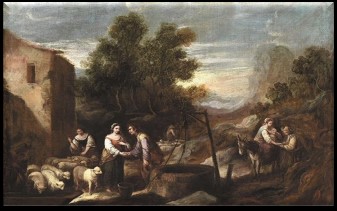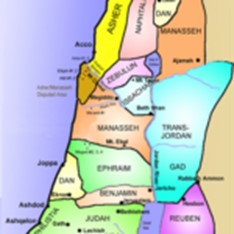Jacob Finds His Wife

Jacob and his Uncle Laban teaches us how we should live a righteous life not a life full of deceptions. How would you like to work for fourteen years for something you should have only worked seven years for?
Genesis 29:1-30
Jacob continued his journey to Haran where his Laban, his mother’s brother lived. Once Jacob went to the well in the field Rachel, the daughter of Laban, came to water the sheep. Jacob was so excited to see Rachel that he kissed her, lifted up his voice and wept. Rachel ran to tell her father.
Laban was so excited to hear the news of Jacob that he ran to meet him and embraced him, and kissed him, and brought him to his hours. Laban wanted Jacob to work for him and asked him what his wages should be. Laban had two daughters. Leah was the oldest and had tender eyed. Rachel was the younger daughter who was beautiful and well favored. Jacob loved Rachel and told Laban that he would work for him for seven years if only he could marry Rachel.
Once Jacob had worked the seven years Laban gathered together all the men of the place and made a feast. Instead of marrying Rachel Jacob married Leah. Laban had given his daughter Leah and her handmaid Zilpah to Jacob instead of Rachel. Jacob was very upset and told Laban he had tricked him. Laban told Jacob that in their country the younger could not be given in marriage before the first-born, which was Leah. Jacob had to work for another seven years.
Jacob had fulfilled the seven years of work for the right to marry Rachel. Along with Rachel Laban gave Bilhah here handmaid to his daughter. Jacob loved Rachel so much but he did not love Leah. Laban used trickery for fourteen years to keep Jacob as his worker. Jacob realized that he had used the same type of trickery when he tricked his father into giving him the blessing. He also used the same type of trickery when he told his brother he would give him some portage for his birthright.
What Can This Story Teach Us?
We should learn to be honest with other people in our lives. When we say we will work for a certain amount of wages then that should be what we work for. We should not cheat those we love or work for.
This is the same thing with our parents. If we say we will clean our room in 15 minutes then we should clean our room in that time period. We do not want to be like Jacob or Laban. Have you ever heard that you will reap what you sow? This means if we sow or live a life of goodness then we will reap goodness in return.
If we live our life with deception and dishonesty then you will find other will treat you with deception and dishonesty. Our Father God forgives us, when we ask Him to forgive. Just like Jacob and Laban had to learn to live with the problems that their deceptions cause; we also have to learn to live with the choices we make in our lives.
Cite Article Source
MLA Style Citation:
Holstein, Joanne “Moses and the Burning Bush:.” Becker Bible Studies Library Oct 2014.< https://guidedbiblestudies.com/?p=1773 ,>.
APA Style Citation:
Holstein, Joanne (2014, October) “Moses and the Burning Bush:.” Becker Bible Studies Library. Retrieved from https://guidedbiblestudies.com/?p=1773 ,.
Chicago Style Citation:
Holstein, Joanne (2014) “Moses and the Burning Bush:.” Becker Bible Studies Library (October), https://guidedbiblestudies.com/?p=1773 , (accessed).
